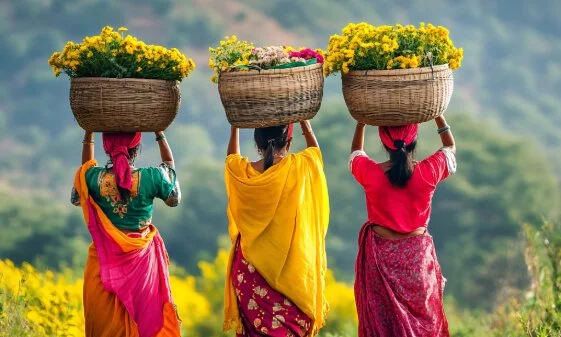Another Crime Against Woman, Missing from India’s ‘Development’ Story
Two Men in Odisha Try to Bury Woman Alive After Raping Her
July 26, 2025
Two brothers in Odisha’s Jagatsinghpur district raped a 15-year-old girl, and when she became pregnant, they tried to bury her alive – the latest of several cases of crimes against girls and women that have come to light in recent months from this state. It appears that, as in other parts of the country, these are men’s reactions to girls asserting control over their own bodies, revealing that India’s claimed growth story must include a different dimension of development.
The girl, a minor, had reportedly been raped several times by the two accused, Bhagyadhar and Panchanan Das. When they learned she was five months pregnant, they called her to a site in their village, Banashbara, under the pretext of helping her get an abortion, as reported by NDTV. At the location, they had dug a ditch and allegedly threatened to bury her in it if she refused to terminate the pregnancy.
She escaped and informed her father, who filed a police complaint at Kujang station. A medical examination was conducted, and police arrested the two accused. A third suspect named is missing.
This case is part of a series of sexual crimes reported from Odisha over the past few weeks. In Jagatsinghpur, another girl was kidnapped and raped by two men while walking home from a birthday party. In Malkangiri, a minor girl was gang-raped by three men. She managed to escape, but on her way home was raped again by a truck driver she encountered.
Twelve such incidents were reported in Odisha in just the past month. A 20-year-old student in Balasore died after setting herself on fire, reportedly because her sexual harassment complaint against a teacher was dismissed. In Nimapada block, a 15-year-old was set on fire and airlifted to AIIMS Delhi for treatment.
Social development is commonly measured through income, access to services and employment. But these cases bring attention to a different axis of development – the basic recognition of girls and women as full persons whose lives are protected by the state. In development theory, this is called social inclusion. It means people are not just counted in economic statistics but are respected as equals in how society is organised. In Odisha, the consistent failure to prevent or respond adequately to such violence suggests that girls are excluded at a foundational level.
In psychology, the idea of “learned helplessness” explains how individuals exposed to repeated harm begin to believe that they have no power to escape or resist. This applies not only to survivors of violence but also to those around them – family, teachers, neighbours – who may stop expecting change and withdraw from any attempt to intervene. The violence may become part of everyday life if institutions such as police, schools and health workers, reflect this helplessness or reinforce it.
Societies serious about development invest in “public legitimacy,” where state institutions are trusted to protect and serve all citizens equally. But a girl setting herself on fire after being ignored, or threats of burial alive used to avoid accountability, show the social contract does not apply to girls. Their protection is treated as negotiable, not guaranteed.
Such violence also has economic consequences. Girls drop out of school due to fear, stigma, or trauma, losing years of education and future earnings. Families relocate, withdraw daughters from public life, or restrict their mobility. This reduces the labour force, lowers productivity, and weakens trust in state institutions. These effects build quietly, away from headlines about GDP and infrastructure.
In India, state and central governments often treat sexual violence as a mere criminal issue, but rarely as a sign of developmental breakdown. Policies aimed at women’s empowerment tend to be limited to schemes or subsidies. They do not confront the everyday contempt and fear that girls face in homes, schools, streets and police stations. Without changing public attitudes, legal reform has limited reach.
A country where girls are unsafe in routine situations – walking home, studying, refusing sex – cannot describe itself as progressing. Development without the dignity and safety of girls is a claim without substance. What is happening in Odisha is not a social problem separate from national ambition. It is central to the question of whether India is truly developing, or simply changing its numbers without changing its values.
You have just read a News Briefing by Newsreel Asia, written to cut through the noise and present a single story for the day that matters to you. Certain briefings, based on media reports, seek to keep readers informed about events across India, others offer a perspective rooted in humanitarian concerns and some provide our own exclusive reporting. We encourage you to read the News Briefing each day. Our objective is to help you become not just an informed citizen, but an engaged and responsible one.

